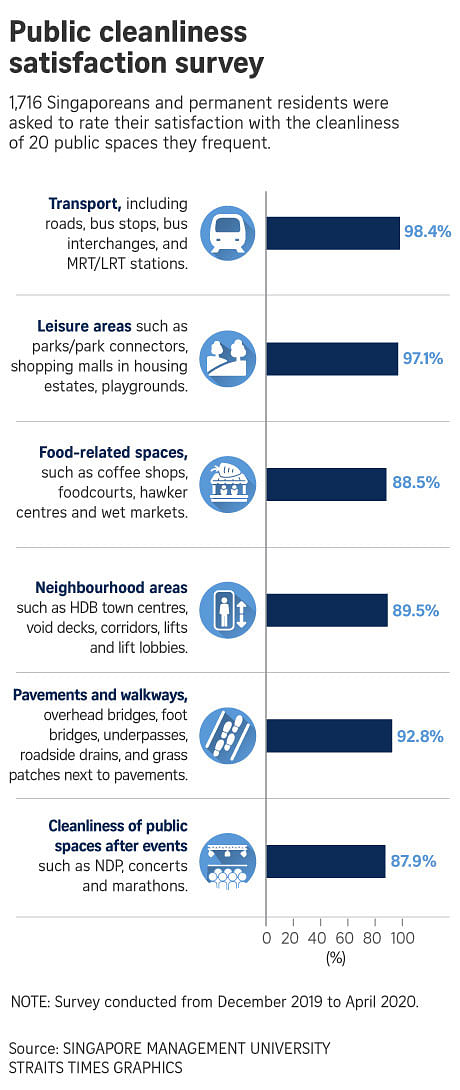SINGAPORE - An overwhelming majority of around 95 per cent of Singapore residents are keen on laws and enforcement when it comes to public hygiene in places such as childcare centres, eateries and malls.
The third wave of the Public Cleanliness Satisfaction Survey undertaken by Singapore Management University (SMU), whose results were released on Friday (Sept 18), polled 1,716 Singaporeans and permanent residents aged 21 and above.
The survey, based on responses collected from last December to April this year before the start of the circuit breaker, asked residents about their perceptions about public cleanliness and hygiene in Singapore.
Unlike the previous two editions of the survey conducted between October 2016 and March 2017, and from August to December 2018, this wave included an additional component regarding public hygiene.
While maintaining public cleanliness involves removing dirt or litter from public spaces, maintaining public hygiene goes a notch higher and involves disinfecting public spaces to kill germs and minimise the spread of infectious diseases.
The majority of those polled were concerned about the level of hygiene in public places, with about 97 per cent agreeing that there should be laws to require stricter hygiene standards for shared spaces such as childcare centres, eldercare facilities, schools, food establishments and shopping centres.
Respondents also wanted building operators to be made responsible for the public hygiene of their buildings.
When it came to public cleanliness, the survey showed increased satisfaction across the board compared with previous years.
About 93 per cent of respondents were satisfied with the cleanliness of public spaces they recently visited, a 9 per cent hike from 2018.
Both Professor Paulin Tay Straughan, SMU's dean of students and professor of sociology (practice), and Dr Mathew Mathews, senior research fellow at the Institute of Policy Studies at the National University of Singapore, who led the survey together, agreed that the ramping up of cleaning efforts due to the Covid-19 pandemic may have led to the increase in satisfaction levels.
Prof Straughan said: "We see all the negative effects of Covid-19 but it also has opened opportunities for us to do things that we might not have normally done with urgency. Careful attention to public hygiene is something that is appropriate at this time.
"I do think if we take advantage of the opportunities that we have now, we might have a higher chance of changing behaviour in a sustainable way," she added.
Despite the overall satisfaction, 23 per cent of respondents noted that the thoroughness of the cleaning in hawker centres and coffee shops was still insufficient.
When it came to returning of trays in food and beverage establishments, 36 per cent said they were unsure whether trays should be returned.
About the same number of respondents expected cleaners to return the trays instead.
The results of the survey threw light on Singapore's reliance on cleaning services to ensure the cleanliness of surroundings.
In fact, 87 per cent of respondents acknowledged that Singapore is clean only because of the efficiency of its cleaning services.
Less than half of the respondents indicated they would volunteer in a neighbourhood group that championed cleanliness matters.
When asked about satisfaction with public cleaning services, most felt the thoroughness of cleaning at different spaces was adequate, with 12 per cent saying that the thoroughness of cleaning efforts in areas such as MRT and LRT stations is, in fact, excessive.
The study went on to suggest some ways the public could improve public cleanliness and hygiene.
For example, it suggested that cleaners in food and beverage outlets could put in less active effort to clear trays, which would send a strong message that it is the patrons' duty to return trays.
It also suggested that the Government could consider how building operators can be accountable and transparent about public hygiene matters.



